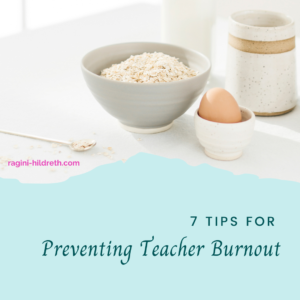
In my career as a teacher, I have found that it can be an incredibly demanding and stressful profession.
With long hours, large class sizes, and constant pressure to perform, it is no wonder that so many teachers experience burnout at some point in their careers.
Burnout can have serious consequences for both teachers and their students.
I know this only too well.
During a particularly busy period, I didn’t recognise that the tiredness I was feeling was extreme because the school was in a post-Ofsted month and everyone was tired.
Uniformed about the issue, I wasn’t aware of the signs of burnout and sadly, my health deteriorated.
I was unable to finish the school year with a much-loved class and it took me several months to recover.
Although there are no quick fixes to deal with the pressures of teaching, there are strategies that can help.
These 7 tips are a useful starting point to help teachers prevent burnout.
Tip 1 Get organized
One of the best ways to prevent teacher burnout is to get organized.
By using daily, weekly or longer-term planners, you can make sure that you are using your time wisely.
Planning to include rest times, and social and family events in your schedule will boost your well-being and using a yearly planner helps to even out your workload.
Also, include regular ’empty spaces’ in your planning.
It might be tempting to fill these dates, but they are brilliant to give you the flexibility to deal with unexpected challenges that arise.
Tip 2 Set realistic goals
Teachers are busy people and can easily slip into the routine of aiming to accomplish a great deal for themselves and their students.
Setting realistic short, medium and long-term goals for yourself is a great habit to develop because trying to do too much can be one of the quickest ways to burn out.
When I coached a primary school teacher, she was aiming to complete a higher degree whilst taking on additional leadership responsibilities.
She was struggling to find time to get everything done as a class teacher, but her main issue was that she had started several projects that were all unfinished which made her feel anxious.
By the end of our coaching program, she reported that she felt that she had grown through focusing on her organisational systems.
She said that workload was not such an issue anymore because
- She was more relaxed about unfinished projects because she focused on completing one before moving on to another
- She started to delegate tasks for team members to complete
- She asked other teachers in her year group to take up some responsibilities.
Tip 3 Create a support system
When you’re feeling stressed, it can be helpful to talk to someone who understands the challenges of being a teacher.
Whether it’s a colleague, friend, or family member, having someone to share your feelings with can make a huge difference.
Also, developing professional relationships is beneficial for conversations that are inappropriate outside of school.
Tip 4 Make time for yourself
It’s important to remember that you are not just a teacher and that there is life outside of school!
Be intentional to schedule some time each week for activities that you enjoy or spending time with friends and book regular breaks and holidays so that you can recharge.
It’s also important to take breaks, both mental and physical when you start to feel overwhelmed.
Find a space and take a few minutes to yourself away from all the demands.
Spending time in nature can help you feel more connected to the world around you and gives you some space when daily life is intense.
Tip 5 Be mindful of your health
Eating well, exercising, and getting enough sleep are all important for preventing burnout.
It’s easy to skip meals and stay up late to meet deadlines.
However, when this becomes our routine, the likelihood of burnout increases.
Boosting your overall health puts you in a better position to handle the pressures of life.
Tip 6 Set boundaries
It’s important to set boundaries with your students, colleagues, and family members to prevent burnout.
Let people know what you are and are not willing to do, and stick to your limits.
One of the best ways to set boundaries is to decide what you want to commit to and to stick firmly to your decision.
Saying “yes” to everything will quickly lead to overwhelm so don’t hesitate to decline requests.
It’s okay to say “no” sometimes, even if it means disappointing someone.
Tip 7 Seek professional help
If you find that you are struggling to cope with the stress of your job, don’t be afraid to seek professional help.
There is no shame in admitting that you need help, and professionals can provide you with the tools and support you need to cope with stress healthily.
A Headteacher I worked with said that asking for help
“can be one of the bravest things that you can do.”
I will always appreciate the support I received from a coach when I was struggling with teaching full time whilst coping with family ill health.
Experiencing the positive impact of her help is one of the reasons I retrained and now coach teachers professionally. Just click to learn more.
Conclusion
My experience of the impact of burnout is not unique.
One trainee teacher talked about what she wished she had known from the beginning.
I wished I had known how important it is to set a cut-off time for working.
Trainee Teacher
A senior school leader told me that her greatest challenge was
balancing family commitments with working life.
Senior School Leader
From trainees to Headteachers, juggling a demanding job with family and other responsibilities can be difficult, which is why it’s important to take steps to prevent burnout.
Getting organized, setting boundaries, taking breaks, and prioritizing your time, can reduce the likelihood of experiencing burnout.
While it’s not possible to eliminate every stress, these tips can help you manage it healthily.
Burnout is a serious issue for teachers, but it doesn’t have to be an inevitable consequence of the job.
By taking steps to prevent burnout, you can make sure that you stay healthy and continue to do the job you love.

COMMENTS